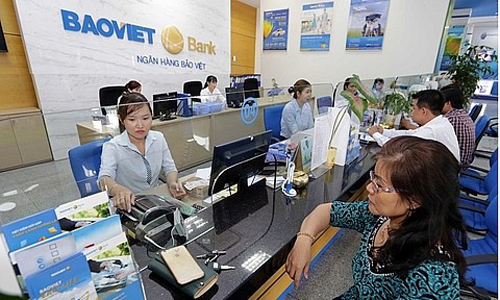Experts forecast lending rates to remain stable
ABO/VNA - Many commercial banks have recently increased deposit interest rates, but experts forecast that the rise will last only a short time and won’t have a domino effect on lending rates.
 |
| Banks have recently raised interest rates sharply by 0.5-1.4 percentage points per year, especially for long-term deposits. (Source: VNA). |
The market has recently seen many banks, such as Viet Capital Bank, Viet A Bank, Military Bank, ACB, TPBank, SeABank, Nam A Bank, VIB Bank and BIDV, raise interest rates by 0.5-1.4 percentage points per year, especially for long-term deposits.
Viet Capital Bank has recently raised the 24-month rate from 7.2 percent to 8.6 percent per year, making it the highest rate in the market.
At Viet A Bank, the highest interest rate of 8.5 percent per year is applied for tenor of 18 months or more. Particularly for seven-month tenor, deposit customers are subject to an interest rate of 8 percent per year. If using online savings, customers will enjoy an interest rates of 8.1 percent.
Military Bank and Eximbank listed 24-month and 36-month rates at 7.5 percent and 8 percent per year, respectively.
Meanwhile, ACB applied new interest rates for terms from 18 months and more, with a rise of 0.1-0.3 percentage points from rates in May 2018.
Customers with larger deposits can even enjoy higher interest rates of fluctuating from 7 percent to 7.2 percent per year.
After many months keeping the rate steady, the State-owned BIDV has recently joined private banks in hiking interest rates, but for short-term deposits.
The bank’s rates for terms of one and two months, five months and six months have been adjusted up by 0.2 percentage points to 4.3 percent, 4.8 percent and 5.3 percent per year, respectively.
According to experts, banks have to raise deposit interest rates as they have to prepare to meet a new central bank regulation on capital use early next year, while capital demand often surges sharply ahead of the year’s end, and inflation remains high.
BIDV chief economist Can Van Luc said that banks have to prepare capital for the last few months of the year, since this is the time when demand for credit and demand for capital utilisation often increases sharply.
Besides, banks have to raise interest rates to attract more deposits after their credit growth rate was higher than the capital mobilisation rate in the first seven months of the year. Banks’ credit growth in the seven months rose by some 8 percent while mobilised capital increased by some 6 percent.
Banking expert Nguyen Tri Hieu said that banks also need to accelerate the mobilisation of more medium- and long-term capital to meet the requirement of cutting the maximum ratio of using short-term funds for medium and long-term lending from the current 45 percent to 40 percent from January 1 next year, in line with the SBV Circular 06.
Despite the rising deposit interest rates, both Luc and Hieu forecast that lending interest rates would be kept stable in the remaining months of the year as the liquidity of the banking system is quite good while the Government and SBV are determined to keep the rate stable.
SBV has so far decided to tighten credit in order to keep inflation below 4 percent throughout 2018 and to limit pressure in 2019. With little credit growth limit left, commercial banks will have to enhance the bad debt resolution, promote capital mobilisation and issue secondary bonds if they want to expand lending in the remaining months of 2018.
In addition, SBV continues to direct the credit flows to production, business and priority areas, and strictly control lending to the areas with potential risks such as real estate, securities and consumer loans.
(Source: VNA)
 về đầu trang
về đầu trang







